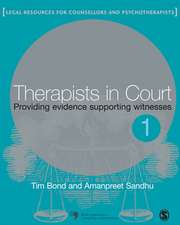Ethical Reasoning for Mental Health Professionals
Autor Gary G. Forden Limba Engleză Paperback – 8 mar 2006
- Survey of major principles and methods of ethical reasoning;
- Innovative framework to support individual ethical reasoning and decision making;
- A comprehensive presentation of ethical issues pertaining to therapy, assessment, industrial/organizational work, teaching, and research;
- A cutting edge chapter on ethics and the use of technology in clinical practice;
- Numerous case situations to exemplify ethical dilemmas and ethical responses;
- Inclusion of ethical codes pertaining to both counseling and psychotherapy.
| Toate formatele și edițiile | Preț | Express |
|---|---|---|
| Paperback (1) | 918.93 lei 6-8 săpt. | |
| SAGE Publications – 8 mar 2006 | 918.93 lei 6-8 săpt. | |
| Hardback (1) | 1203.96 lei 6-8 săpt. | |
| SAGE Publications – 8 mar 2006 | 1203.96 lei 6-8 săpt. |
Preț: 918.93 lei
Preț vechi: 1258.80 lei
-27% Nou
Puncte Express: 1378
Preț estimativ în valută:
175.83€ • 183.59$ • 145.53£
175.83€ • 183.59$ • 145.53£
Carte tipărită la comandă
Livrare economică 04-18 aprilie
Preluare comenzi: 021 569.72.76
Specificații
ISBN-13: 9780761930945
ISBN-10: 0761930949
Pagini: 408
Dimensiuni: 187 x 232 x 22 mm
Greutate: 0.68 kg
Ediția:1
Editura: SAGE Publications
Colecția Sage Publications, Inc
Locul publicării:Thousand Oaks, United States
ISBN-10: 0761930949
Pagini: 408
Dimensiuni: 187 x 232 x 22 mm
Greutate: 0.68 kg
Ediția:1
Editura: SAGE Publications
Colecția Sage Publications, Inc
Locul publicării:Thousand Oaks, United States
Recenzii
"I would really recommend this as an excellent class text and desk reference. I would describe this as a very comprehensive, up to date text on ethics that includes most mental health professionals.
This was very thorough and well written….the inclusion of case examples throughout the chapters really brought home the points that the author was trying to make. The author was very skilled at going into depth while covering the ethical dimensions and did not merely provide superficial discussion."
"A comprehensive description of the ethical issues in clinical and counseling psychology grounded in a philosophical approach to thinking about ethics. The approach it takes of emphasizing ethical theory and reasoning is strong and more useful than the more typical code based approach."
This was very thorough and well written….the inclusion of case examples throughout the chapters really brought home the points that the author was trying to make. The author was very skilled at going into depth while covering the ethical dimensions and did not merely provide superficial discussion."
"A comprehensive description of the ethical issues in clinical and counseling psychology grounded in a philosophical approach to thinking about ethics. The approach it takes of emphasizing ethical theory and reasoning is strong and more useful than the more typical code based approach."
Cuprins
Preface
Ch 1. Introduction
What is Ethics
Ethics and Personal Values
The Role and Values in the Practice of a Mental Health Profession
Why do Professions Develop Ethical Standards?
The History of Ethics in Psychology
"Ethical Principals of Psychologists and Code of Conduct"
Counseling: Code of Ethics
Psychiatry: The Principles of Medical Ethics, With Annotations Especially Applicable to Psychiatry
Social Work: Code of Ethics of the National Association of Social Workers
The Limitations of Ethical Codes
Ethics and Law
Summary
Ch 2. "Ethical Principles of Psychologists and Code of Conduct"
Introduction and Applicability
Preamble
General Principles
Summary
Ch 3. Counseling's Code of Ethics
Preamble
ACA Code of Ethics Sections
The Existence of Ethical Conflict
Summary
Ch 4. Models of Ethical Reasoning and Their Effectiveness in Resolving Ethical Conflict
The Philosophical Basis of Ethical Judgments
Utilitarianism
Kant's Formalist Ethical Theory
The Need for Ethical Problem-Solving Skills to Address Conflicts Between Ethical Principles
Ethical Relativism
Ethical Contextualism
Summary
Ch 5: A Model of the Ethical Decision-Making Process
The Purpose of the Model
The Model
A Case Example Applying the Model of Ethical Decision Making
Summary
Ch 6: Ethical Issues in Psychotherapy and Counseling
Informed Consent
Confidentiality
Multiple Relationships
Conflict of Interest
Competence
Respect for Clients' Autonomy
Termination
Practice Case Involving the Model of Ethical Decision Making
Summary
Ch 7: Organizational Settings and Special Populations
Working Within an Organization
Conflict of Interest
Working in a Psychiatric Hospital
Managed Care Practice
Working in Forensic (Correctional) Settings
Mental Health Professionals in the Military
Psychotherapy With Children
School Psychology and Counseling
Practice Case Involving the Model of Ethical Decision Making
Summary
Ch 8: Ethical Issues in Assessment and Testing
The Value and Ethical Implications of Psychiatric Diagnoses
Psychological and Educational Assessment and Testing
Multicultural Issues in Psychological Assessment
Ethics and Test Validity
Use of Computerized Test Administration, Scoring, and Interpretation
Report Writing
Special Considerations in College Orientation Testing
Practice Case Involving the Model of Ethical Decision Making
Summary
Ch 9: The Use of Computer Technology in Professional Practice
Specialty Guidelines for E-Therapy
Beneficence
Nonmaleficence
Integrity
Competence
Informed consent
Confidentiality
Conducting Assessments Using the Internet
Conclusion
Practice Case Involving the Model of Ethical Decision Making
Summary
Ch 10: Practice and Assessment in Organizational and Business Settings
Working for a Business Organization
Competence
Consulting Relationships
Special Considerations in Industrial/Organizational Assessment
Entrepreneurial Practice of a Mental Health Profession
Practice Case Involving the Model of Ethical Decision Making
Summary
CH 11: Ethical Issues in Teaching and Supervision
Competence
Informed Consent
Multiple Relationships
Confidentiality
Professional and Scientific Responsibility
Teaching Students About Values and Professional Ethics
Ethical and Legal Issues in Supervision
Practice Case Involving the Model of Ethical Decision Making
Summary
Ch 12: Ethical Issues in Research
Ethics, Values, and Theory Construction
Conducting Research With Human Participants
Protecting Research Participants From Harm
Informed Consent
Special Considerations in Conducting Research With Children
The Use of Deception in Research
Confidentiality
Ethical Issues Concerning the Use of Student Subject Pools
Ethics and Scientific Merit of Research
Ethical Issues in Data Collection and Analysis
Ethical Issues in Publishing Research Results
Ethical Issues in Conducting Research on the Internet
Ethical Issues in Conducting Animal Research
Practice Case Involving the Model of Ethical Decision Making
Summary
Ch 13: Mental Health Professions and the Law
Legal Issues in Hospital Admission for Psychiatric Treatment
Involuntary Hospitalizations: The Psychiatric Commitment Process
The Rights of Psychiatric Inpatient Clients
Ethical Considerations in Suicide Preventions
Forensic Practice in the Mental Health Professions
What if Ethics and the Law Conflict?
Practice Case Involving the Model of Ethical Decision Making
Summary
Ch 14: State Boards, Ethics Committees, and Ethics Complaints
When Professionals Identify Unethical Conduct
State Boards of Psychology and Counseling
Professional Organizations' Ethics Committees
Dealing Appropriately With a State Board of Ethics Committee Inquiry
Legal Complaints Against Mental Health Professionals
Avoiding Difficulties by Functioning as an Ethical Professional
Practice Case Involving the Model of Ethical Decision Makings
Summary
References
Appendices
A: "Ethical Principles of Psychologists and Code of Conduct"
B: ACA Code of Ethics
Ch 1. Introduction
What is Ethics
Ethics and Personal Values
The Role and Values in the Practice of a Mental Health Profession
Why do Professions Develop Ethical Standards?
The History of Ethics in Psychology
"Ethical Principals of Psychologists and Code of Conduct"
Counseling: Code of Ethics
Psychiatry: The Principles of Medical Ethics, With Annotations Especially Applicable to Psychiatry
Social Work: Code of Ethics of the National Association of Social Workers
The Limitations of Ethical Codes
Ethics and Law
Summary
Ch 2. "Ethical Principles of Psychologists and Code of Conduct"
Introduction and Applicability
Preamble
General Principles
Summary
Ch 3. Counseling's Code of Ethics
Preamble
ACA Code of Ethics Sections
The Existence of Ethical Conflict
Summary
Ch 4. Models of Ethical Reasoning and Their Effectiveness in Resolving Ethical Conflict
The Philosophical Basis of Ethical Judgments
Utilitarianism
Kant's Formalist Ethical Theory
The Need for Ethical Problem-Solving Skills to Address Conflicts Between Ethical Principles
Ethical Relativism
Ethical Contextualism
Summary
Ch 5: A Model of the Ethical Decision-Making Process
The Purpose of the Model
The Model
A Case Example Applying the Model of Ethical Decision Making
Summary
Ch 6: Ethical Issues in Psychotherapy and Counseling
Informed Consent
Confidentiality
Multiple Relationships
Conflict of Interest
Competence
Respect for Clients' Autonomy
Termination
Practice Case Involving the Model of Ethical Decision Making
Summary
Ch 7: Organizational Settings and Special Populations
Working Within an Organization
Conflict of Interest
Working in a Psychiatric Hospital
Managed Care Practice
Working in Forensic (Correctional) Settings
Mental Health Professionals in the Military
Psychotherapy With Children
School Psychology and Counseling
Practice Case Involving the Model of Ethical Decision Making
Summary
Ch 8: Ethical Issues in Assessment and Testing
The Value and Ethical Implications of Psychiatric Diagnoses
Psychological and Educational Assessment and Testing
Multicultural Issues in Psychological Assessment
Ethics and Test Validity
Use of Computerized Test Administration, Scoring, and Interpretation
Report Writing
Special Considerations in College Orientation Testing
Practice Case Involving the Model of Ethical Decision Making
Summary
Ch 9: The Use of Computer Technology in Professional Practice
Specialty Guidelines for E-Therapy
Beneficence
Nonmaleficence
Integrity
Competence
Informed consent
Confidentiality
Conducting Assessments Using the Internet
Conclusion
Practice Case Involving the Model of Ethical Decision Making
Summary
Ch 10: Practice and Assessment in Organizational and Business Settings
Working for a Business Organization
Competence
Consulting Relationships
Special Considerations in Industrial/Organizational Assessment
Entrepreneurial Practice of a Mental Health Profession
Practice Case Involving the Model of Ethical Decision Making
Summary
CH 11: Ethical Issues in Teaching and Supervision
Competence
Informed Consent
Multiple Relationships
Confidentiality
Professional and Scientific Responsibility
Teaching Students About Values and Professional Ethics
Ethical and Legal Issues in Supervision
Practice Case Involving the Model of Ethical Decision Making
Summary
Ch 12: Ethical Issues in Research
Ethics, Values, and Theory Construction
Conducting Research With Human Participants
Protecting Research Participants From Harm
Informed Consent
Special Considerations in Conducting Research With Children
The Use of Deception in Research
Confidentiality
Ethical Issues Concerning the Use of Student Subject Pools
Ethics and Scientific Merit of Research
Ethical Issues in Data Collection and Analysis
Ethical Issues in Publishing Research Results
Ethical Issues in Conducting Research on the Internet
Ethical Issues in Conducting Animal Research
Practice Case Involving the Model of Ethical Decision Making
Summary
Ch 13: Mental Health Professions and the Law
Legal Issues in Hospital Admission for Psychiatric Treatment
Involuntary Hospitalizations: The Psychiatric Commitment Process
The Rights of Psychiatric Inpatient Clients
Ethical Considerations in Suicide Preventions
Forensic Practice in the Mental Health Professions
What if Ethics and the Law Conflict?
Practice Case Involving the Model of Ethical Decision Making
Summary
Ch 14: State Boards, Ethics Committees, and Ethics Complaints
When Professionals Identify Unethical Conduct
State Boards of Psychology and Counseling
Professional Organizations' Ethics Committees
Dealing Appropriately With a State Board of Ethics Committee Inquiry
Legal Complaints Against Mental Health Professionals
Avoiding Difficulties by Functioning as an Ethical Professional
Practice Case Involving the Model of Ethical Decision Makings
Summary
References
Appendices
A: "Ethical Principles of Psychologists and Code of Conduct"
B: ACA Code of Ethics
Notă biografică
Gary G. Ford, Ph.D., is a professor in the Department of Psychology at Stephen F. Austin State University. He teaches both undergraduate and graduate courses, such as professional ethics, theories of personality, personality assessment, history and systems of psychology, human consciousness, existential psychology, and psychopathology. He is also actively involved in providing practicum supervision in the clinical psychology graduate program. Among the areas he has published in previously are professional ethics, substance abuse, psychological defense, existential psychology, and sports psychology. He served on the Editorial Board of Journal of Research in Personality for six years.
Dr. Ford received his Ph.D. in clinical psychology from Fordham University, Bronx, New York, and his M.A. in philosophy from the University of Illinois at Urbana-Champaign. His interdisciplinary academic background in philosophy and psychology has provided him with a unique perspective on the complex task of developing an ethics book for mental health professionals that will enable them to reason effectively when confronted with the ethical conflicts that invariably arise in their professional practice. He has been a licensed clinical psychologist for nearly 20 years and has been affiliated with Veterans Administration Medical Centers and worked in private practice. He has served on IRBs and ethics committees in both hospital and university settings. He has administered psychology licensing examinations as an Oral Examiner for the Texas State Board of Examiners of Psychologists and conducted continuing education workshops in professional ethics.
Dr. Ford received his Ph.D. in clinical psychology from Fordham University, Bronx, New York, and his M.A. in philosophy from the University of Illinois at Urbana-Champaign. His interdisciplinary academic background in philosophy and psychology has provided him with a unique perspective on the complex task of developing an ethics book for mental health professionals that will enable them to reason effectively when confronted with the ethical conflicts that invariably arise in their professional practice. He has been a licensed clinical psychologist for nearly 20 years and has been affiliated with Veterans Administration Medical Centers and worked in private practice. He has served on IRBs and ethics committees in both hospital and university settings. He has administered psychology licensing examinations as an Oral Examiner for the Texas State Board of Examiners of Psychologists and conducted continuing education workshops in professional ethics.
Descriere
This core textbook not only provides ethical and legal issues, along with representative case studies, it also-and more importantly-helps students to develop their own framework for ethical reasoning. The author surveys various methods of ethical reasoning and then helps students to apply ethical principles to novel professional circumstances.












